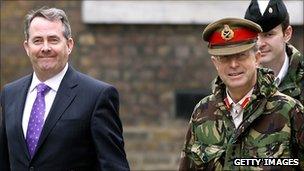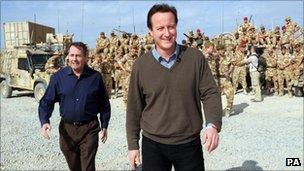What sort of legacy did Liam Fox leave at the MoD?
- Published

Liam Fox had a disagreement with General Sir David Richards over when Col Gaddafi was a target
Defence Secretary Liam Fox has resigned after a week of pressure over his working relationship with friend and self-styled adviser Adam Werritty. But what is his legacy at the Ministry of Defence?
Liam Fox was the Ministry of Defence's seventh secretary of state since 1997.
The ministerial musical chairs under Labour had undermined efforts to get to grips with the MoD's chaotic finances and the need for serious reform.
When Mr Fox arrived at main building he came with a blueprint for change.
He clearly relished the challenge and said he had a vision of what the armed forces should look like by 2020.
He was going to repair what he called the "car crash" in the MoD's budget and he accused Labour of leaving a £38bn black hole in the ministry's finances.
He was confident he would be in charge for some considerable time - and would be leaving the MoD and the military in better shape.
He embarked on his reforms with his characteristic enthusiasm and vigour.
For the first time in 12 years he was going to carry out a comprehensive strategic defence review.
Skirmishes over cuts
But constrained by the government's political priority to cut the deficit, his hands were also tied.
Mr Fox engaged in early skirmishes with the Treasury as to how deep the cuts should go.
A private letter to the prime minister in which he aired his concerns was leaked.
He crossed swords with the chancellor as to who should pay for the replacement for the Trident nuclear deterrent.
In the end the cuts would be deep, but without him they could have been even deeper.

Liam Fox accompanied David Cameron to Afghanistan while they were still in Opposition
As a standard bearer for the right of his party, Mr Fox had some political cover.
Nevertheless, when he wielded the axe there were sharp intakes of breath. The scrapping of the aircraft carrier HMS Ark Royal, along with the entire fleet of Harrier jets; and new Nimrod spy planes, provided alarming headlines.
Labour, armchair generals and former military top brass accused the government of presiding over a rushed cuts exercise rather than the promised "strategic" review of Britain's defences.
Nor did large scale-redundancies for all three services endear him to those in uniform.
The MoD's own recent survey of attitudes among military personnel showed a worrying drop in morale.
That said, military chiefs reluctantly accepted the need for reform and no-one senior resigned in protest.
For Mr Fox proof that he was winning the argument.
War on two fronts
His ambitious reforms are all the more remarkable given that Britain was soon fighting a war on two fronts.
Military chiefs complained of overstretch as the UK took a lead in operations over Libya, to add to the already significant commitment in Afghanistan.
The first sea lord warned that he did not have enough ships.
There were tensions too over strategy.
Mr Fox suggested Colonel Gaddafi was a legitimate target. The Chief of the Defence Staff, General Sir David Richards, said he was not.
But the disagreements did not break out into all out war.

Liam Fox decided to scrap the new Nimrod reconnaissance jets
Friends of the former defence secretary speak of his frustration at not being able to see it through.
It was obvious he loved his job and wanted to stay.
It may have clouded his judgement as he tried to hang on.
His successor Philip Hammond is left with plenty of unfinished business.
Military operations over Libya may nearly be over, but Afghanistan's future is far from certain.
The foundations for reforming the MoD's cumbersome procurement process may have been laid.
'Safe hands'
But there's no proof yet this government will be any better than the last at delivering big defence projects on time and on budget.
Mr Hammond takes over with a reputation as a pair of "safe hands".
But he seems to have little background in defence and will have to win the trust of those in uniform.
More than anything else, as the eighth secretary of state at the MoD since 1997, he will have to show that there will be some continuity.
The armed forces have only just about swallowed the last lot of painful changes.